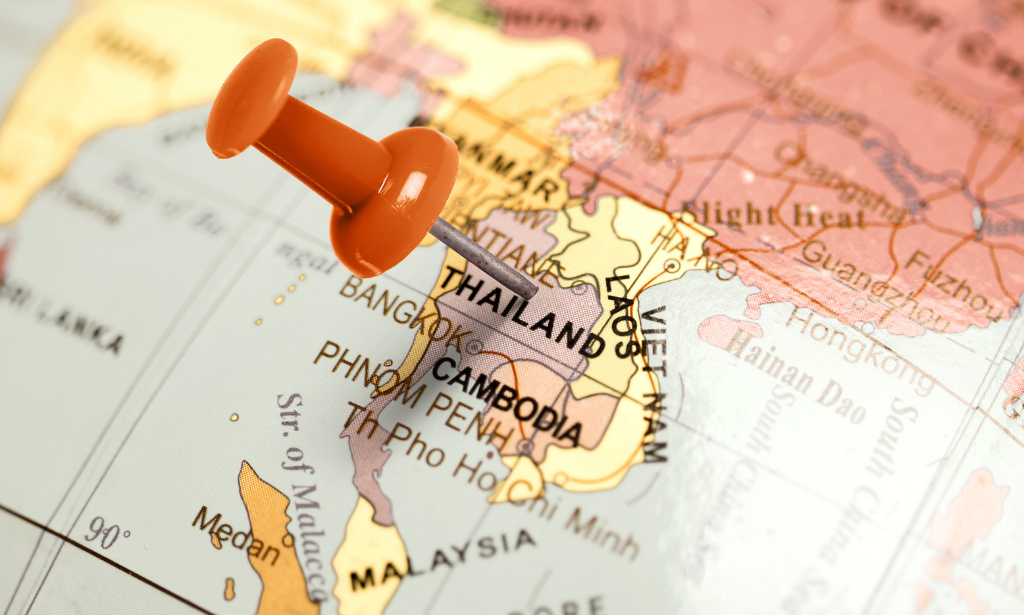Just like any other type of schooling, homeschooling is an international endeavor. Millions of families around the world have made the decision to take their child’s education into their own hands, especially during and in the wake of COVID-19. And, like the United States, every country has its own opinions, philosophies, and laws surrounding homeschooling.
In this monthly series, we’ll take a look at different countries around the world and how they view homeschooling as well as the types of laws (if any) those countries have to govern homeschooling. The first country we visited was the second-largest country in the world, and the northern neighbor to the United States–Canada. Then we went island hopping to the Philippines and Puerto Rico before cruising on over to South Africa. We headed back to the Caribbean to the Dominican Republic, and now we’re traveling all the way to Southeast Asia to Thailand!
Neighbor to Cambodia, Laos, and Myanmar (Burma), the country of Thailand is home to nearly 72 million citizens, ranking number 20 among the world’s countries by population. The country is nearly 200,000 square miles in size, making it a bit larger than Spain. The capital city of Bangkok is far and away the most populous in the country, with more than 11.2 million residents. If you’ve ever heard of the country of Siam–that was Thailand’s name until 1939.
Rules and Requirements for Homeschooling in Thailand
According to the Home School Legal Defense Association, homeschooling is perfectly legal in Thailand. The country’s constitution and education law clearly recognize alternative education as a legitimate avenue and consider family to be an educational institution. In 2004, Thailand’s government passed a homeschool law (petitioned by the country’s homeschoolers) that states “the right to basic education by the family” governs homeschooling. The only real requirements for homeschooling in Thailand are that families must submit an application to homeschool, and all students are to be assessed annually.
If you’re considering homeschooling in Thailand, you’re certainly not alone in your journey. Below is a list of homeschooling groups in Thailand that can help provide support and answers to your questions. Our Bridgeway families homeschooling in Thailand also have created their own homeschooling group on Facebook!
BKK Bangkok Kids Facebook Group
Thailand Homeschool Curriculum Exchange Facebook Group
Thailand Homeschool Network Facebook Page
BangkokPlus Homeschoolers Facebook Group
Thailand’s School System
The compulsory age for students in Thailand ranges from 7 to 15. Compulsory schooling starts at primary level, also known as Prathom Suksa, from the age of six; secondary school education, known as Mathayom Suksa, is divided into lower and upper secondary and is compulsory until the age of 15. In all, you’re looking at nine years of basic education offered in Thailand–six years of primary school and three years of lower secondary school.
The Thai educational system is further broken down into three types:
- Formal: education that children receive in a classroom
- Non-formal: education focusing on life skills through distance learning, establishing workplace and community learning centers, and promoting the joint sharing of resources with the formal school sector
- Informal: education provided outside the classroom (in libraries, museums, through educational media, etc.)
Though quite a few reforms and projects have been undertaken in order to improve Thailand’s education system, it’s still one that struggles to keep up with many other countries’. A few recent studies demonstrate as much, with Thailand showing up near the bottom of the world’s rankings of education systems.
- In 2015, Thailand was ranked 47th out of 76 countries in global school ranking by the Organisation of Economic Co-operation and Development (OECD). This ranking is based on test scores from the Programme for International Student Assessment (PISA) for 15-year-olds and the Trends in International Mathematics and Science Study for 14-year-olds, in 2012 and 2011 respectively.
- The 2018 Programme for International Student Assessment (PISA) exams demonstrated poor performance by Thai students, who consistently performed below the international average in reading, math, and science.
- U.S. News & World Report ranked Thailand #44 in education out of 87 countries in 2023.
A former teacher in Thailand summed up the state of the country’s education system by saying this: “Plagued by inadequate funding, huge class sizes (more than 55 students to a class is normal), terrible teacher training, students that seem to have little motivation, and a system that forces teachers to pass students even though they have actually failed – there doesn’t seem to be much hope education in Thailand will improve any time soon.”
If that wasn’t bleak enough, the teacher continued, “The Ministry of Education in Thailand though is one of the most ineffective organizations I have ever dealt with. Thailand is now facing a crisis in education, and it is easy to see why. Thai students are not taught to think for themselves. Some of the kids just sleep through class, as the teacher often doesn’t notice if they are listening or not. Books are limited, science equipment doesn’t exist in a lot of schools, and western teachers in government schools are often unqualified and have no interest in teaching their students anything. But as many Thai schools cannot afford to pay more than $750-$800 a month for a western teacher, they get what they pay for.”
Is this how you’d want your child to be educated? Absolutely not, says Celine Poraksa, a Thailand resident and mother to six-year-old Arin. “I am not happy with the education system in Thailand. We planned to move to another country and find the right school for her last year. Due to the pandemic, our plan had to be postponed.”
So, what was Celine’s solution? Homeschooling!
Bridgeway in Thailand
Bridgeway Academy is the homeschool choice for more than a dozen students in Thailand–in fact, Celine and Arin are actually part of the Bridgeway family! And now they’re enjoying the benefits of a high-quality, flexible education that’s personalized to fit each child’s learning style.
“I was looking for an academy that offers international curriculums with accreditation and all-in-one service,” said Celine. “The platform must be easy for my 6-year-old child to use as she has to study at her pace during the day without me. Bridgeway is the one that matches my needs.”
If you’re currently living in Thailand or are planning on moving there, remember that Bridgeway offers plenty of amazing homeschool programs–plus accreditation (just like Celine was looking for), record-keeping, and support–that can be used anywhere in the world! And just like we did for Arin and Celine, Bridgeway can help your family choose the right program to fit your needs.
“Our advisors and the team members are always supportive. They have helped us walk through the first-year homeschool journey smoothly,” Celine continues. “My child enjoys homeschooling with Bridgeway and the flexibility that is offered. She also got perfect grades with the Honor Rolls for both semesters!”
You can download our free PDF about homeschooling with a U.S.-based program and then contact our admissions team today at (800) 863-1474 to start your homeschool adventure.
Stay tuned–we’ll be bringing you homeschooling info from another international location soon!








